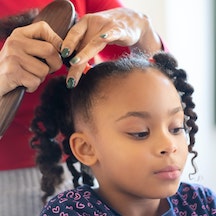 New research led by scholars at Arizona State University finds that a large percentage of young Black girls have negative experiences such as teasing and unwanted touching related to their hair.
New research led by scholars at Arizona State University finds that a large percentage of young Black girls have negative experiences such as teasing and unwanted touching related to their hair.
The research team worked with community organizations to recruit participants. The study included girls aged 10–15 years old who identified as Black or African American. The girls answered a series of open-ended questions about satisfaction with their natural hair, social comparisons of hair, bullying or teasing because of their hair, and pressure to wear their hair a certain way.
When the girls were asked to define “good hair,” the most common answers included descriptions like “long,” “flowy,” “wavy,” “soft” and “straight.” “Bad hair” was described as “short,” “nappy” and “hard to comb through.”
Large numbers of Black girls reported verbal teasing or bullying because of their hair, starting in preschool or kindergarten. The prevalence of verbal teasing or bullying was dwarfed by touching girls’ hair without permission. Touching of hair without permission was reported by 78 percent of 10-year-olds, 50 percent of 11-year-olds, 81 percent of 12-year-olds, 65 percent of 13-year-olds, and 70 percent of 14-year-olds.
“Having an understanding of what Black kids go through is important, even for something that might seem trivial like hair,” said Mel Holman, a graduate student at Arizona State University and a co-author of the paper. “This study shows different types of discrimination and microaggressions that young kids might go through that are not recognized by others because people think it’s just hair.”
“These girls should not have to be resilient,” said Marisol Perez, an associate professor of psychology at Arizona State University and senior author of the paper. “We all need to do a better job celebrating natural hair – in the media, in school settings, and in the beauty industry, which financially benefits from girls and women thinking they need to alter their hair.”
Dr. Perez added that parents can also role model wearing natural hair and complimenting it. Parents reinforcing natural hair in themselves and in their kids is a powerful message for youth that can increase their body confidence.
The full study, “Examination of Hair Experiences Among Girls with Black/African American Identities,” was published on the website of the journal Body Image. It may be accessed here.

